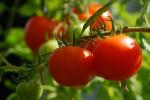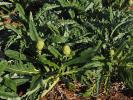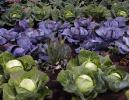H2020 TomRes Project: A Novel and Integrated Approach to Increasing Tolerance to Multiple and Combined Stresses in Plants Using Tomato as a Model
- Type Project
- Status Filled
- Execution 2017 -2021
- Assigned Budget 5.996.175,00 €
- Scope Europeo
- Main source of financing Horizon 2020
- Project website Proyecto TomRes
Tomatoes are one of the most widely cultivated agricultural products in Europe. They are grown in many countries, both in open fields and in protected areas. However, tomato cultivation is threatened by water and nutrient stress. The EU-funded TomRes project seeks to provide a much-needed solution through extensive research and development.
The project will begin by carefully selecting diverse accessions that demonstrate stress tolerance while maintaining high quality and yield. This process involves identifying desirable traits that contribute to stress tolerance. The project will also conduct rigorous testing and optimize agricultural strategies.
The ultimate goal of TomRes is to provide farmers and specialists with valuable data and results.
The first line of TOMRES research was the selection of resilient tomato lines and resilience-related alleles. Following a preliminary literature-based selection, TOMRES screened 219 accessions that were tested to obtain the TOMRES Collection (TC), which was screened under combined stress for several, often less investigated, traits such as root architecture and arbuscular mycorrhization. Two resilience QTLs under combined stress were identified from a tomato x pennelli population, and 95 resilience gene alleles in tomato were identified and phenotyped. A second TOMRES focus was the investigation of the role of strigolactones (SL) and root-related traits in resilience to combined stress. In this case, the effects of SL on WUE and NUE were assessed through treatments and genetic depletion. SL increased root exudation and P use efficiency under P-deficiency conditions. Furthermore, SL improved drought stress memory and affected the expression of selected miRNAs. The use of SL as a component of agricultural biostimulants was established.
Root phenotyping of TC accessions was performed using advanced techniques, and the genetic control of mycorrhizal infection was studied. Hundreds of genes and epigenes involved in combined stress responses were studied using transcriptomics, q-RT-PCR, and chromatin-targeted omics techniques. The TOMRES approach included a significant focus on crop management research. Polyculture with legumes (bean, cowpea, and faba bean) was optimized, and the project selected new native wild rhizobia strains. The application of biostimulants to increase AUE and NUE was addressed, with a particular focus on two products developed by TOMRES partners, which showed very promising results. The application of plant growth-promoting rhizobacteria was tested. Two TC accessions showed promising results as rootstocks. Finally, variable-rate treatment technologies for precision agriculture were optimized and tested in field trials under water stress.
Data centrally collected by TOMRES were incorporated into an open-access repository. An environmental impact analysis was performed: TOMRES' innovative solutions showed encouraging results, with reduced soil nutrient loss, heavy metal accumulation, and microbial contamination. An economic and social impact analysis was conducted based on field data and two independent surveys (in Italy and the EU). Two decision support systems were implemented using TOMRES data, which are available to farmers, policymakers, and consumers to facilitate their decisions toward resilient tomato cultivation. TOMRES implemented an ambitious program of field trials and demonstration activities. Within the TOMRES Farmers' Network, more than 15 on-farm trials were conducted, focusing on the evaluation of TOMRES accessions, biostimulants, and field management techniques. The field trials confirm that TOMRES innovation can help farmers cope with combined stress, provided attention is paid to the local environment and techniques. TOMRES partners organized participatory field trainings at the test sites.
Press releases and social media outlets, along with a regular newsletter, were distributed to the general public. Participatory events were organized for farmers, who were also provided with information through technical publications and summaries of EIP agricultural practices. Scientific communication was based primarily on scientific articles, workshops, and a summer school.
Vegetable crops require large volumes of water and fertilizers. However, water is often scarce, and agricultural consumption competes with civil and industrial use. Fertilizers are becoming limiting for environmental and economic reasons, while eutrophication impacts soil and water quality. TOMRES research has focused on developing processes and resources that increase plant resilience to combined drought and nutrient stress and maximize water and nutrient use efficiency, focusing on tomato, a major European crop.
The overall objectives of TOMRES have been addressed as follows: TOMRES has identified resilient tomato lines, novel alleles, and genetic traits conferring superior NUE and WUE through a wide-ranging program of screening existing accessions and searching for and cloning new QTL and alleles. TOMRES has improved the basic knowledge of the physiological and molecular processes activated in tomato by combined stress, elucidating the role of hormones, particularly strigolactones, and of candidate genes, also related to belowground traits such as root architecture and arbuscular mycorrhization. TOMRES has designed and optimized sustainable crop management strategies that enhance resilience to combined stress, such as multicropping with legumes, rootstock selection, application of biostimulants developed within the project, and variable-rate techniques for precision irrigation and fertilization.
TOMRES has evaluated the impact of adopting these innovative tools by analyzing their economic, social, and environmental impacts, and developing Decision Support Systems for informed decision-making in tomato cultivation. TOMRES has provided an enabling environment for the implementation and adoption of project results through open, multi-stakeholder activities, including on-farm trials and demonstrations, innovation management for commercialization, participatory training activities with farmers, scientific workshops and a summer school, scientific publications, a policy brief, and media communication.
The tomato is one of the EU's main agricultural products. It is grown throughout Europe in open and protected fields and in greenhouses, representing a model biological and agronomic crop.
Combined water and nutrient stress is a major problem for tomato growers, and solutions are needed to safeguard yields while preserving the environment. From more than 10,000 available samples, TOMRES will select rootstocks and scions that tolerate combined stress while maintaining fruit quality and yield, leveraging innovative selection approaches. New traits, particularly subterranean ones, will be identified and can be exploited in breeding.
The role of selected hormones (strigolactones and brassinosteroids) will be studied to identify other resilience traits. TOMRES will test and optimize sustainable crop management strategies, such as legume intercropping, precision fertilization and irrigation techniques, manipulation of symbiotic microorganisms, and the use of rootstocks better suited to soil water and nutrient uptake.
New X genotype management strategies will be developed with the aim of reducing N and P application by at least 20% and water input by 40%, while ensuring the environmental sustainability and economic viability of the proposed solutions. Testing will be integrated with environmental (greenhouse emissions, water quality) and socioeconomic impact analysis. Agronomic, environmental, and economic data will be processed for model building and a Decision Support System. Demonstration and dissemination activities will follow the entire course of the project and transfer results to different environments and other farming systems, thus ensuring the greatest impact of the acquired knowledge on the EU economy. Transdisciplinary knowledge transfer between farmers, breeders, industries, associations, and scientists will be ensured through a robust multi-stakeholder approach from the planning stage.
Reducing water and fertilizer requirements in tomato crops provides a solid foundation for next-generation tomato breeding that is more environmentally and economically sustainable. Tomato is one of the EU's staple crops, grown across Europe in open and protected fields, as well as in greenhouses. Tomato growers face combined water and nutrient stress in their crops, and solutions are needed to safeguard harvests and preserve the environment. The EU-funded TomRes project tested and optimized sustainable crop management strategies such as legume intercropping, precision irrigation and fertilizer techniques, manipulation of symbiotic microorganisms, and the use of rootstocks best suited for water and nutrient uptake from the soil. Project partners implemented a selection process to identify tomato genotypes most resilient to combined stress (drought and nutrient stress). “From around 10,000 available accessions, more than 200 were screened in the open field, including 80 long-lived Mediterranean landraces, to select a TomRes collection of 43 accessions of lines endowed with superior tolerance to combined stress,” explains Andrea Schubert, project coordinator. How to make tomatoes more resilient and higher-yielding TomRes contributed basic science advances, such as more than 20 new alleles (and lines carrying them) that can help control tomato performance under stress and be used in marker-assisted selection for resilience. The project provided new insights into the role of two key phytohormones, strigolactones and brassinosteroids, in plant resilience, development, and environmental memory.
Through advanced phenotyping technology, TomRes discovered new root-associated traits relevant to combined stress resilience. These new traits are related to root architecture and physiology and are associated with beneficial microbes. “We were able to optimize management practices (variable-rate irrigation and fertilization, resilient rootstocks, biostimulants, green manures, and rotations) and select combinations of these to achieve optimal combined stress resilience in tomatoes,” says Schubert. The selected tomato lines and resilience traits represent an accessible resource for tomato breeders interested in providing resilient genotypes to farmers.
Optimized management techniques have been shown to achieve the project's stated goal of reducing water and fertilizer requirements. TomRes now provides a solid foundation for next-generation tomato breeding that is more environmentally and economically sustainable. Applying project concepts to future research Project partners provided the necessary reports and are now actively involved in promoting a research environment where, with the help of national and EU funding, TomRes concepts can be further improved and implemented, both in tomato and other crops. One example is the PRIMA-funded VEG-ADAPT project, which transfers TomRes concepts to the Mediterranean area and other crops. Farmers and industry participating in the network are laying the groundwork for the commercial exploitation of project results that interest them. The project greatly benefited from a Stakeholder Board, established to provide advice and feedback throughout the project and contribute to TomRes' multi-stakeholder approach.
Outreach to scientists, farmers, and the general public was intensive and continued throughout the COVID-19 pandemic, with an online summer school and two workshops held. Surveys on consumer acceptance of sustainable tomatoes have been successful in disseminating the project's concepts and gauging public interest in novel, more environmentally friendly, and sustainable cultivation systems.
TOMRES integrated different layers of research to efficiently address the problems of combined stress resilience and water and nutrient use efficiency. A few figures can convey the magnitude of the work undertaken by TOMRES, the progress and results achieved, and their impacts.
Impact on farmers: Two decision support systems to support farmers in tomato crop management; Participatory learning events in the TOMRES farmer network comprising 17 farmers in 5 EU countries; A range of sustainable technical solutions, including multiple cropping, biostimulants, rootstocks, and variable rate techniques, increasing WUE and NUE under combined stress in the field by up to 20%; 8 technical publications and 23 EIP-AGRI practice summaries. Impact on industry: Two QTLs isolated for resilience to combined stress; 95 novel alleles for resilience to be used in breeding programs; Two biostimulants developed and characterized under field conditions; Four companies developing new products based on TOMRES innovation. Impact on science: Over 200 tomato accessions examined under combined stress; 31 newly characterized genes linked to resilience. More than 15 field trials of crop management techniques; one summer school and two scientific workshops; 78 open access scientific publications, including 31 in peer-reviewed journals; Impact on policymakers and the general public: one opinion paper; participation in five major open events; >75 press articles and >700 press releases; TOMRES offers a rich legacy of field-validated research that will be used to further develop new techniques for stress-resistant and energy-efficient tomatoes. TOMRES has also been a shining example of how different layers of research can be successfully integrated to generate novel and effective innovation tools in agriculture.
Finally, TOMRES data will support research in future projects targeting environmental sustainability and climate change adaptation in vegetable crops.
- UNIVERSITA DEGLI STUDI DI TORINO (UNITO)






